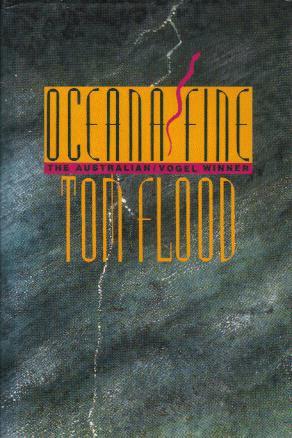
Tom Flood
The following novels constitute the shortlist for the 1990 Miles Franklin Award:

|
Oceana Fine Tom Flood |
Dustjacket synopsis:
"Beneath a vast constructed/deconstructed landscape (both human and geographic) lies a labyrinth of disused mineshafts.
It is a landscape in which vast saline lakes suddenly appear overnight, in which wheat babies disappear into wheat
fields, in which lizards are mistaken for rocks, in which a huge grain silo becomes a cathedral and a gold front-end loader
the angel of the apocalypse. It is a place where history repeats/mirrors itself and is populated by doppelganagers and
we find ourselves following the after-image of the phosphene as though it was a manuscript hoping for illumination.
"The book deals with multiplicity of perception - through history/memory, national mythologies, families and writing (blood and ink), puzzles and their reasons - which might be said to be their execution."
Quotes:
"Oceana Fine is the name of a new strain of wheat - but there is nothing of uniformity in the novel of that name.
It sticks up from the plain of naturalism more jagged and more distinctive than a silo. From realism almost to
surrealism, this is a novel always original, exciting, different. Go for it! And three cheers for Tom Flood, a new
author with ideas and daring!" - Geoffrey Dutton
First Paragraph:
The landscape is so immense, hot and huge like nothing on this earth, that I fear it might swallow me. The heat makes its own horizon, multi-layered and inconstant. Out of this mirage runs a highway.
A car approached, a young man at the wheel. He pressed his boot down more heavily on the accelerator pedal and tightened his grip on the wheel. The car burned along the lonely highway through miles of brown-green bushland and straw-coloured paddocks, the stubble of the wheat blotched with charcoal-green tree clumps and bounded only by the endless miles of fencing strung to the horizon.
Not that this car was alien to such a landscape. It was as much a part of it as the pink-and-grey galahs which dived across the red road and swept back over it at the last second, dangerously close to the car front, as if to show their superior powers. Occasionally, too, one proved otherwise. The bare metal floor of the cab was already silted with red-brown dust. The same dust that, in the hard bright light, filtered every angle of view from the car, a cream FC Holden ute with banged-up bodywork and windows that could not be closed for fear of becoming ill in the leaking petrol fumes.
From the Allen and Unwin hardback edition, 1989.
Notes:
This novel was the winner of the Australian/Vogel Award in 1988.
About the Author:
Tom Flood was born in Sydney in 1955 and grew up in Western Australia. After working as a wheat sampler, geologist's
assistant, tuna fisherman, ore sample pulveriser, bus conductor, paperboy, guitarist and songwriter he began writing
prose in 1985.
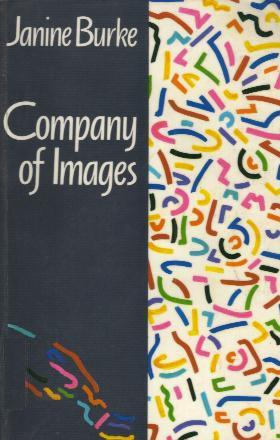
|
Company of Images Janine Burke |
Dustjacket synopsis:
"Welcome to the world of art.
"Meet the painters, their dealers and lovers, demons and muses.
"Margeurite weaves a web of mysteries and truths; Buff creates the angel of his destruction; Carmen deadlocks with a black canvas; Alona weighs books against babies; Miriam makes art from the stuff of her life; Callender plans the ultimate exhibition.
"In this thoroughly enjoyable, funny, sad and wise novel, prize-winning author Janine Burke paints a group portrait that is both rich and authentic."
Quotes:
"Hers is a poet's sensibility, an original and passionate one." - Beverley Farmer, Australian Book Review
First Paragraph:
It was William Blake's fault. Since she'd pinned up The Whirlwind of Lovers she'd spent more time gazing at the stream of wind-borne bodies than she had preparing her afternoon class. That was the problem with images. Inner doors flew open, the mind greeting strange visions like long-lost friends, and before she knew it she'd entered the world of the picture, whatever universe appeared. She'd found the reproduction amongst a cluster of dog-eared cards stuffed in her desk's top drawer. Sometimes she shuffled them to find the weird and accidental combinations made by a fat, malicious Bronzino baby next to the pure blindness of a Cycladic head, a nervy Goya princess against Ingres' snoozing odalisques. Michelangelo's Moses, storming in marble. Anubis, god of the dead, cackling from the Louvre. This collection, made of journeys and tastes past, was her diary, a picture-memory, to be played with, added to, while some were selected for the place of honour above her desk. Blake went up this morning. He had been ill when he did the drawing: she saw him bent over the task, an old poet, all staring eyes and sweating brow. It was easy for her, one and a half centuries later, to be swept away by the spectacle. She enjoyed extremes, though not so much in her own life. Better up on the wall, encased by time. The drawing was about passion gone well and truly wrong. She'd read Dante, she knew the story. Yet the impression was not one of doom, even if the lovers were buffeted by hell's merciless blasts, but rather something pleasing to the eye and to the heart as if, underneath it all, Blake admitted it was better to burn.
From the Greenhouse paperback edition, 1989.
About the Author
Janine Burke was born in Melbourne in 1952. While completing a fine arts degree at the University of Melbourne
she began writing art criticism for journals and newspapers, and organising exhibitions of art. Between 1977 and 1982
she taught art history at the Victorian College of the Arts and took out an MA from La Trobe University. Since then
she has written fiction full-time. Her novel Second Sight won the 1987 Victorian Premier's Award for fiction.

|
Maestro Peter Goldsworthy |
Dustjacket synopsis:
"Against the backdrop of Darwin - that small, tropical hothouse of a port, half-outback, half-oriental, lying at the tip of North Australia - a young and newly arrived southerner encounters the 'maestro', a Viennese refugee with a shadowed past. The occasion is a piano lesson, the first of many..."
Quotes:
"The necessary elusiveness of perfection, the umplumbed ocean beneath articulateness, the ambivalence of beauty - these
are the revolving concerns of Peter Goldsworthy, and handled not just with irony but with an effervescent, compassionate
wit. He can't help being funny, but he's wise too." - Gerard Windsor, Australian Book Review
"A profound exploration of European exile and Australian adolescence...beautifully constructed, elegantly performed,
deeply moving" - Caryl Phillips
"I enjoyed Maestro enormously. Besides its thoughtfulness and bright sensuality, it has a playful quality, a
love of jest, which appealed to me very much." - Helen Garner, Sydney Review
"A beautifully crafted novel dealing with the tragic gulf between talent and genius; between the real and the
spurious." - C.J. Koch
First Paragraph:
First impressions?
Misleading, of course. As always. But unforgettable: the red glow of his face - a boozer's incandescent glow. The pitted, sun-coarsened skin - a cheap, ruined leather. And the eyes: an old man's moist, wobbling jellies.
But then ... the suit: white linen, freshly pressed. And - absurdly, in that climate - the stiff collar and tie.
'Heff Keller?'
'Mrs Crabbe?'
I stood behind my mother outside his room at the Swan, perched on a wooden balcony overlooking the beer garden. The hotel - a warren of crumbling weatherboard, overgrown with bougainvillea - was packed, the drinkers and their noise spilling out of the front bar into the garden. Up the stairs, second on the right, a barman had shouted - and every face in the bar had turned and followed us up. One or two drunken whistles had also followed us up; whistles living far beyond their sexual means, my mother later reported to my father, contemptuously.
'This is Paul,' she said, pushing me forward, ignoring the noise below.
The figure in the white suit stood aside from his doorway, and motioned us inside.
'Of course. Your father has told.'
The accent was thick. Continental, my father had described it, vaguely. A voice that reminded him of grilling sausages: a faint, constant spitting of sibilants in the background.
'Sit down,' the voice hissed. 'We will talk.'
A problem: how to capture that accent here? Ve vill talk? It's tempting - too tempting - to slip into comic-book parody. We haf ways off makink ...
From the Angus and Robertson paperback edition, 1997.
About the Author:
Peter Goldsworthy was born in Minlaton, South Australia, in 1951. He grew up in various country towns, finishing his
schooling in Darwin. Since graduating in medicine from the University of Adelaide, he has devoted his time equally to
medicine and writing.
Peter Goldsworthy has published three collections of poetry, including This Goes With That: Selected Poems 1970-1990. He is the author of four collections of short fiction, including Little Deaths, and four novels, including Honk if You Are Jesus and Wish. He has won numerous awards including the Commonwealth Poetry Prize and an Australian Bicentennial Literary Award.
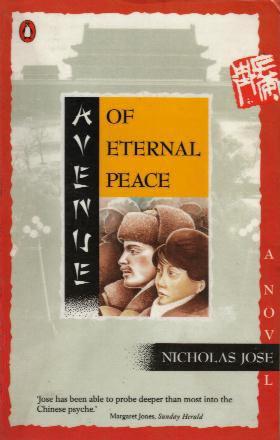
|
Avenue of Eternal Peace Nicholas Jose |
Dustjacket synopsis:
"After forty years of communist rule, the ancient civiliaation of China, newly exposed to western influences, is in a
state of vigorous contradiction. Enter Wally Frith, a leading cancer specialist, who travels from the gritty frozen
north to the tranquil lakes and mountains of the south, looking for answers.
"Does traditional Chinese medicine contain a possible cancer cure? Professor Hsu Chien Lung might have - the clue, but did he ever exist? Is the elegant, enigmatic linguist, Jin Juan, really trying to help Wally in his quest?
"As he fights through a maze of bureaucracy and subterfuge, Wally falls in with people whose lives reflect the diversity of contemporary Peking: a model, shady traders, a basketballer, students, a dissident artist and a band of eccentric westerners.
"Finally, Peking opera turns to a passionate drama for freedom and democracy, when thousands of Chinese students occupy the grey streets of the capital."
First Paragraph:
The map under glass made no sense. Wally Frith fingered the wad of notes that Mrs Gu had given him.
She had been all befuddled, bespectacled smiles at the airport, as they lugged his baggage through the frozen night in search of the car. Now, in the overheated room to which she had delivered him, she presented a different face. Perched uncompromisingly on the arm of a chair, she explained the forms that the Foreign Affairs Office required him to complete.
'Just tell me what to do,' Wally obliged.
'No, no,' she protested, as if it were unthinkable to tell anyone what to do. 'I need eight passport photographs. Meanwhile you will be welcome to a banquet next week. Professor Doctor Frith, thank you.'
She was gone before daylight broke, leaving him to study the map under glass on the table in front of him, his neck rucking the antimacassar of the sofa on which his body longed to doze. So this is China, he thought, reaching for the bottle of duty-free scotch and, on inspection of the bathroom, splashing his face with icy water that was unfit to drink. The mission for day one was to procure eight passport photographs. As morning lightened he was lovingly lacing the old polished walking boots that in younger days had taken him over mountains in three continents. He opened the door, trekked carefully downstairs and stepped outside into a chilly draught of icy dust and soot that tickled his nostrils. There was no green thing in sight, only the grey sky suffused with silver brightness, liverish bricks and tiles, and slashes of scarlet woodwork on the old rooftops. The buildings of Peking Union Medical College, for three-quarters of a century China's leading teaching and research hospital, were moored like a fleet of galleons in the pale and frozen world. Wally pulled down the fur hat his White Russian colleague had bequeathed him, 'from the old days', and marched forward.
From the Allen and Unwin paperback edition, 1998.
About the Author:
Nicholas Jose was horn in 1952 in England but grew up in Broken Hill, Traralgon, Perth and
Adelaide. He studied at the Australian National University and Oxford. He has since lived and
worked mainly in Canberra and in England, Italy and China.
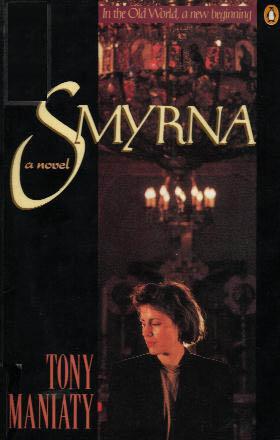
|
Smyrna Tony Maniaty |
Dustjacket synopsis:
"In 1922, the great Mediterranean seaport of Smyrna is ablaze: the Greeks are forced from Asia Minor in defeat. Among the refugees is Theo Tekaros, whose long journey ends in Australia. 'I was a lost soul; you'd better believe it. . .' He meets Trixie at a wartime dance, and falls in love.
"Sixty years later, their son Harry, a radio journalist deserted by his wife, heads back to Greece and Turkey in search of his father's beginnings, the past. A perpetual beginner, he is captivated by two women: an elderly bookseller in Constantinople and a Greek theatre actress. Like a latter-day Ulysses blown miles off course, Harry falls in love too. But the fabric of truth is delicate, he discovers, and mysteries abound on this planet of possibilities."
First Paragraph:
It's true, he thought. I always imagined that I'd think more often of my parents when they were dead, but lately I've hardly thought of them at all.
Other matters took a lot of time, he realised, and kept shuffling. They always did photograph well. Here's one of them dressed up - in Brisbane in the forties, during the war. They were avid swing dancers in those days, had actually met at the City Hall dance: the place crawling with Americans and the odd Greek or two. Behind them was the night sea, which turned out later to be a painted backdrop. Only it must have been 1948, he realised, after the war because Trixie was three months pregnant. 'You're in the photograph,' she liked to say. And in this photo too, his father Theo - broad face smiling over a pin-striped, double-breasted suit - appears to have finally discovered his mark, after all the turmoil.
From the Penguin paperback edition, 1989.
About the Author:
Tony Maniaty was born in Brisbane, Australia in,1949, the son of a Greek father and an Australian mother. Most of his early life was spent in and around the family's corner stores.
He has worked for more than twenty years in radio and television journalism - for ABC News, Radio Australia, SBS Australia, Visnews, the BBC World Service and Monitoradio in the USA. His coverage of the political turmoil and fighting in Timor in 1975 inspired his first novel, The Children Must Dance (Penguin, 1984).
Several awards followed, including the NSW Premier's Fellowship and the Marten Bequest; and in 1985 he won the National Short Story Award with a story outlining the search for his father's past. His travels in Turkey and Greece also formed the basis for Smyrna.
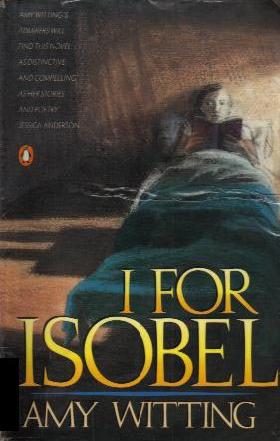
|
I For Isobel Amy Witting |
Dustjacket synopsis:
"Born to a world without welcome, Isobel observes it as warily as an alien trying to pass for a native. Her
collection of imaginary friends includes the Virgin Mary and Sherlock Holmes. Later on, she meets Byron, W.H. Auden
and T.S. Eliot. She is not as much at ease with the flesh-and-blood people she meets, and least of all with herself,
until a lucky encounter and a little detective work reveal her identity and her true situation in life."
Quotes:
"Isobel is instinctively searching for a lost part of her substance, the very memory of which has been obliterated.
Prompted by her inexplicable sense of loss, she goes on her way, deviating, baffled, yet rejecting substitutes. To call
the ending happy is to say both too much and too little. Was the lost part also searching for her? Amy Witting's
admirers will find this novel as distinctive and compelling as her stories and her poetry." - Jessica Anderson
"[Witting] lays bare with surgical precision the dynamics of families, siblings, students in coffee shops, office coteries.
One sometimes feels positively winded with unsettling insights. There is something relentless, almost unnerving in her
anatomising of foibles, fears, obsessions, private shame, the nature of loneliness, the nature of panic." - Janette Turner
Hospital
"When we come to write the history of Australian writing in the twentieth century, the strange case of Amy Witting will be
there to haunt us. Here is a writer who not only has great gifts -- the kind of expert and mimetic gifts that would impel
instant recognition from someone who admired a fine-lined American naturalist like William Maxwell -- but a realist who has
an effortless immediacy and a compelling sense of drama that should have ensured the widest kind of appeal, the sort of
appeal that Helen Garner could command in her fiction writing days. And yet this woman who published in the New
Yorker and commanded the respect of Kenneth Slessor was scarcely encouraged during the long gray sleep of Australian
fiction publishing. It wasn't until the publication of I for Isobel a bare decade or so ago that Witting gained a
national profile." - Peter Craven
First Paragraph:
A week before Isobel Callaghan's ninth birthday, her mother said, in a tone of mild regret, 'No birthday presents this year! We have to be very careful about money this year.'
Every year at this time she said this; every year Isobel chose not to believe it. Her mother was just saying that, she told herself, to make the present more of a surprise. Experience told her that there would be no present. As soon as they stepped out of the ferry onto the creaking wharf and set out for Mrs Terry's lakeside boarding house, where they spent the summer holidays, the flat reedy shore, the great Moreton Bay fig whose branches scaffolded the air of the boarding-house garden, the weed-bearded tennis court and the cane chairs with their faded flabby cushions, all spoke to Isobel of desolate past birthdays, but she did not believe experience, either. Day by day she watched for a mysterious shopping trip across the lake, for in the village there was only one tiny store which served as a post office too; when no mysterious journey took place, she told herself they must have brought the present secretly from home. Even on the presentless morning she would not give up hope entirely, but would search in drawers, behind doors, under beds, as if birthday presents were supposed to be hidden, like Easter eggs in the grass.
From the Penguin paperback edition, 1989.
Notes:
You can read more about Amy Witting here.
This page and its contents are copyright © 2006 by Perry Middlemiss, Melbourne, Victoria, Australia.
Last modified: January 26, 2006.